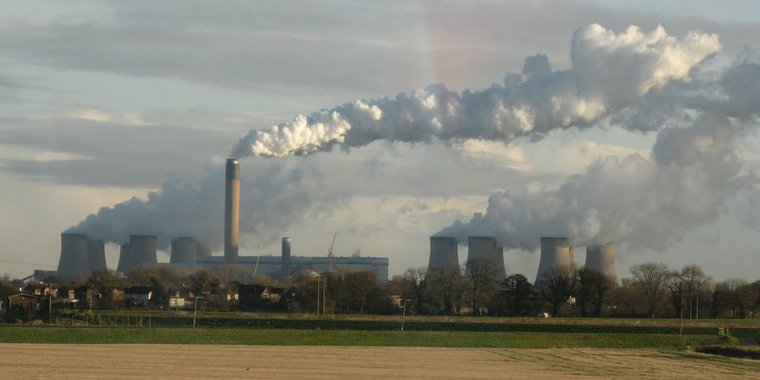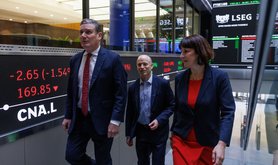
‘Carbon offsetting’ is just greenwash. Here’s what we need instead
openDemocracy caught British Gas trying to ‘offset’ CO2 with worthless carbon credits. But the rot goes deeper


Fifteen years ago, as Valentine’s Day approached, a trio of entrepreneurs took to the streets of Britain selling a brave new idea. Bearing heart-shaped helium balloons and red red roses, they told passers-by about their new company, cheatneutral.com.
“What we do is cheat offsetting,” they say, in what became an early viral YouTube video. “So, if you’re in a relationship and one of you does something you probably shouldn’t have, then you can come to us, and pay us a little bit of money.” To offset the infidelity, the company would invest it in a couple who promise to be faithful.
The launch got widespread, shocked news coverage. The firm’s founders were invited onto broadcast media across the world to justify this nonsense.
It was, of course, a stunt. Carbon offsetting was, at the time, a relatively new idea. Companies from airlines to energy providers were asking customers to pay an extra couple of pounds to ‘neutralise’ their emissions. The filmmakers were climate activists, pointing out the profound silliness of this new capitalist market.
A decade and a half later, though, the scam is back. With global concern about climate change soaring, the market for carbon offsets – a financial product connected to these sham schemes – trebled in size to £1bn last year.
On Friday, my colleagues Martin Williams and Lucas Amin exposed details of British Gas/Centrica’s shockingly poor offset system, under which it offered customers a way to pretend away emissions from their power stations.
But before we get to the specifics, let’s think through the general principle. Because at root, the basic problem with offsetting is one of accounting. If you’re pouring water into a bath from two different taps and are worried it’s going to overflow, then you can’t leave one running in exchange for turning the other one off. You need to turn them both off, and pull the plug.
There are ultimately two things that regulate the chemistry of our air: what goes in, and what comes out. For about 650,000 years, around twice as long as Homo Sapiens have been around, these were in balance. Climate-changing gases which were belched from animals, plants, the land and the sea were breathed back in at an equal rate, producing the relatively steady climate that allowed civilisations to emerge.
In the past 300 years, industrial capitalism has radically altered both sides of the equation. On the one hand, we are pumping heat-trapping chemicals – mostly carbon, but others too – from the lithosphere, the biosphere, and the hydrosphere, into the atmosphere. On the other, we have also reduced the capacity of the planet to pull these chemicals out of the atmosphere, through deforestation, wetland destruction and damage to ocean life.
It’s worth dwelling for a moment on the latter of these, because this is often, though not always, where carbon-offset schemes focus their attention.
Since the 1700s, about 1.5 billion hectares of forest have been cleared globally, nearly an eighth of the world’s landmass. Much of the remaining forest has been degraded to the point that it now emits more carbon than it extracts. In the same time period, something like 85% of the world’s wetlands – an equally vital carbon sink – have been drained. And that’s just on land.
The ocean stores about 20 times more carbon than land-based plants, animals and soil, 50 times more than the atmosphere. Phytoplankton suck CO2 out of the air, then sink down through the twilight zone, either as themselves or in the poo or dead bodies of the fish that eat them, and to the deep ocean floor in an effect that researchers call ‘marine snow’ because you can literally see lumps of carbon falling through the water.
It is, usually, this plankton which, after millions of years, becomes oil and gas.

Marine snow
|Photo by NOAA National Ocean Service via Wikimedia Commons
These algae and the sea life that consume them are responsible for about 40% of carbon sequestered. But the little mites are struggling to do the job. Overfishing, and particularly centuries of whaling, has radically reduced the biomass of our oceans, meaning less carbon is stored in the bodies and shells of sea creatures, and less sinks into the deep blue when they die. There is much less fish and whale faeces to fertilise the plankton. Millions of tonnes that would have been taken from the air to the ocean floor at the time of Moby Dick now stays in the atmosphere, warming the planet.
If we are to return the chemical makeup of the atmosphere to that which allowed complex human societies to rise and flourish, we need both to reduce our emissions of greenhouse gases to pre-industrial levels – that is, almost nothing – and to restore our oceans, wetlands and forests to pre-industrial abundance. If a carbon offset scheme is, say, promising to plant trees somewhere, then it is taking the lack of trees in that place as its baseline, and counting the carbon they sequester as reducing humanity’s total footprint, sometimes calling it ‘negative emissions’. But this is the wrong baseline.
If trees can grow in that place, then they would have done so for most of the history of the holocene – the current geographical epoch. Restoring them doesn’t produce a minus number in your carbon sums. It takes a positive, and makes it zero. It’s a vital thing to do in its own right, but it doesn’t negate the emissions from your whopping great gas power stations.
But Centrica’s carbon ‘credits’ revealed by Martin and Lucas show how carbon ‘offsetting’ has got a lot worse than some tree planting, which is at least sometimes a good thing.
Under one scheme Centrica buys into, a firm has declared ownership of a chunk of the Amazon that actually belongs to an Indigenous tribe, and is demanding a ransom fee not to deforest it. It’s like a smoker telling you it’s OK that they haven’t given up yet, because they had previously formulated a plan to tear open their chest and slice a handful of bronchioles out of one of their own lungs, and now they won’t. So long as you keep paying them. Also, it turns out it’s actually someone else’s lung.
Related story
Another, which accounts for 44% of Centrica’s offsets, involves the firm buying carbon credits from a now banned scheme involving a company on the shores of the Bohai Sea, in eastern China.
Shandong Dongyue Chemical Co Ltd produces chemical refrigerants, using a process that leads to a byproduct called Fluoroform – CHF3. If it’s not disposed of properly, this is a greenhouse gas around 12,400 times as potent as CO2, and governments have agreed to phase it out.
Seeing a business opportunity in the growing carbon credit market, the company came up with a wheeze. Rather than just disposing of its CHF3 properly, it asked other companies to pay it to do so, selling carbon credits in exchange.
There are two problems with this. The first is that these sorts of schemes have encouraged firms to produce more CHF3 just so they can be paid to safely dispose of it. In 2011, Shandong Dongyue Chemical Co Ltd was forced to deny it was “gaming the system” after Bloomberg news agency obtained a highly critical UN report. Xiao Gang Niu, the company’s assistant general manager, insisted that the business wasn’t operating to maximise emission credits.
The second is that Chinese law now requires the company to dispose of the gas properly, and the carbon credit scheme attached to it was suspended by the UN in 2013. The carbon credits Centrica bought in November 2021 to ‘neutralise’ the emissions of power stations in the UK are financial products produced by a firm around a decade ago against a hypothetical threat that it would irresponsibly pollute the atmosphere, in a way that would now be illegal.
Unlike the tree planting example above, the baseline against which this amounts to ‘negative emissions’ isn’t the present. It is an imagined, even worse future, dreamed up by corporate executives and against which the planet is being ransomed.
These threats are then packaged up into financial products and traded on an international market where any real accountability for whichever emissions they claim to have prevented evaporates. Carbon-intensive Western corporations continue to spew fumes into the air, but can now point to the global south and say “but we paid them not to do something even worse, so that makes it better”.
Individualising
But it’s not just a matter of maths. It’s a question of politics. Carbon offsetting exists not to reduce concentrations of greenhouse gases in the atmosphere, but to allow people with real hard power to dissolve responsibility into the general public.
Rather than major matters of state for which politicians and business executives ought to be held to account by citizens, decarbonisation becomes about tick-box choices for consumers. A social problem is individualised away from those with the power to actually solve it to the gnawing guilt of an already over-stretched consumer.
The way we’re going to actually solve problems like the UK’s addiction to carbon-intensive infrastructure isn’t through a series of customers paying companies to ‘offset’ their emissions in some scammy scheme. It’s through mass government action.
The UK is addicted to gas because the then chancellor, George Osborne, decided in the early 2010s that a new ‘dash for gas’ was a sensible ‘bridging’ solution to the country’s energy needs. At the time, environmental activists, and particularly the group ‘No Dash for Gas’, pointed out the absurdities. This was, it was often said, a bridge to nowhere. What’s more, renewables were already by that point cheaper than fossil fuels.
Had David Cameron’s government gone in big for wind, solar and tidal a decade ago, then there would be no need for Britain’s electricity suppliers to sell indulgences.
Read more
Get our weekly email





Comments
We encourage anyone to comment, please consult the oD commenting guidelines if you have any questions.